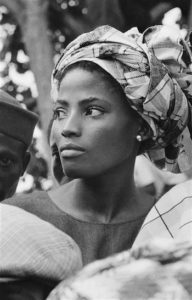
*On this date in 1200, the Yoruba people were briefly affirmed. They are an ethnic group living in western Africa. October 1st was chosen to coincide with Nigeria's independence.
Documented since 1200, the Yoruba are mainly from Nigeria, Togo, Ghana, and Benin. The Yoruba constitute about 44 million people in total. The vast majority of this population is from Nigeria, where the Yoruba make up 16% of the country's population, making them one of the largest ethnic groups in Africa. Most Yoruba people speak the Yoruba language, which is the Niger-Congo language with the largest number of native speakers.
The Yoruba communities share borders with the very closely related Itsekiri to the south-east in the North West Niger Delta, Bariba to the north in Benin and Nigeria, the Nupe also to the north, and the Ebira to the northeast in central Nigeria. To the east are the Edo, Ẹsan, and Afemai groups in mid-western Nigeria. Adjacent to the Ebira and Edo groups are the related Igala people found in the northeast, on the left bank of the Niger River. To the southwest are the Gbe-speaking Mahi, Gun, Fon, and Ewe, who border Yoruba communities in Benin and Togo. To the southeast is Itsekiri, who live in the northwest end of the Niger Delta. They are ancestrally related to the Yoruba but chose to maintain a distinct cultural identity. They are one of many indigenous communities in Africa.
Significant Yoruba populations in other West African countries can be found in Ghana, Benin, Ivory Coast, and Sierra Leone. The Yoruba diaspora consists of two main groupings; one includes relatively recent migrants, most of which moved to the United Kingdom and the United States after major economic and political changes in the 1960s to 1980s. The other dates to the Atlantic slave trade and has communities in the United States, Cuba, Puerto Rico, Dominican Republic, Venezuela, Saint Lucia, Jamaica, Brazil, Grenada, Trinidad and Tobago, and other countries.
As an ethnic definition, the word "Yoruba" (or, more correctly, "Yaraba") was originally about the Oyo Empire and is the usual Hausa name for the Oyo people, as noted by Hugh Clapperton and Richard Lander. It was, therefore, popularized by Hausa usage and ethnography written in Ajami during the 19th century by Sultan Muhammad Bello. The extension of the term to all speakers of dialects related to the language of the Oyo (in modern terminology, North-West Yoruba) dates back to the second half of the 19th century. This was due to the influence of Bishop Samuel Ajayi Crowther, the first Anglican bishop in Nigeria. Crowther was an Oyo Yoruba who compiled the first Yoruba dictionary and introduced a standard for Yoruba orthography.
The alternative name, Akú, comes from the first words of Yoruba greetings (such as Ẹ kú àárọ? "Good morning," Ẹ kú alẹ?" Good evening) and has survived in certain parts of their diaspora as a self-descriptive, especially in Sierra Leone.